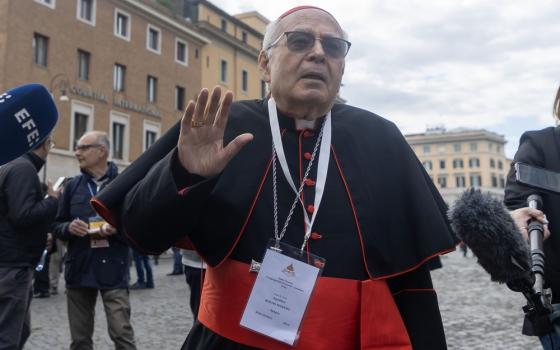
The conviction last week of Kansas City-St. Joseph, Mo., Bishop Robert Finn for failing to report suspected child abuse indicates that "clearly there is a problem" with how the procedures adopted by the U.S. church to protect children are being used, a key adviser to the U.S. bishops on the issue said Monday.
Central to that problem, said Al Notzon III, chairman of the U.S. bishops' National Review Board for clergy sex abuse, is the question of accountability for bishops who do not comply with the norms and conditions the body of bishops agreed to 10 years ago. The procedures are spelled out in the U.S. bishops' Charter for the Protection of Children and Young People.
One of Notzon's predecessors on the review board, Judge Michael Merz, called the Finn case "a serious embarrassment to the church."
"How can you continue to preach that the charter is effective if, in fact, these types of things continue to happen?" Merz asked.
Notzon told NCR on Monday he planned to bring up the problem with the full review board, then make recommendations to the U.S. bishops.
"My concern right now is that there is a problem, and we need to address it," Notzon said. "Our role is to advise the [bishops], and clearly this is an issue that falls under that requirement."
In a non-jury trial Sept. 6, Finn was found guilty of one count of failing to report suspected child abuse, a misdemeanor in the state of Missouri, making him the first sitting U.S. bishop to be convicted of a crime in the decades-long sex abuse scandal.
In an interview Tuesday, the bishop who heads the U.S. bishops' committee tasked with advising their national conference on sexual abuse told NCR that, following Finn's verdict, bishops throughout the country have to recognize they are accountable to their own people for their actions to protect children.
Bishops also have to be "firm" in applying the procedures the body of bishops adopted 10 years ago to prevent child abuse, said Bishop R. Daniel Conlon of Joliet, Ill.
"We've got a long, long way to go," said Conlon, chair of the U.S. bishops' Committee for the Protection of Children and Young People. "But I think that diligent application of the charter is essential. That doesn't mean that there's going to be 100 percent perfection because we're still human beings.
"And we have 190 dioceses in the United States. I can't help the fact that if there is a flaw in one place, that it's counted against one of us. I can't help that." [Read the interview with Conlon.]
Finn's conviction stems from his handling of Fr. Shawn Ratigan, a Kansas City priest who pleaded guilty in August to federal charges of producing and attempting to produce sexually graphic material of minor girls.
Finn had been made aware of issues surrounding Ratigan that a school principal had detailed in a letter in May 2010, and by December 2010, the bishop knew the priest was in possession of graphic images of children's genitalia, according to court testimony. However, he said he did not formally report the priest to police.
Finn also said he did not report concerns about Ratigan to his diocesan review board, an advisory group the U.S. bishops' charter mandates should be present in each Catholic diocese and should be used to evaluate allegations of abuse by priests.
When asked if Finn's failure to notify his review board of allegations against Ratigan signified larger problems with the bishops' charter, Notzon replied: "The charter requires something. If the charter then is not being met, clearly there is a problem. And it has to be addressed."
A failure to notify the diocesan review board was also noted in the Philadelphia archdiocese, where in July, Msgr. William Lynn was found guilty of child endangerment during his time as secretary for clergy from 1992 to 2004.
In February 2011, Ana Maria Catanzaro, chair of the Philadelphia archdiocese's review board, wrote an article for Commonweal in which she said her board "had been advised only about allegations previously determined by archdiocesan officials to have involved the sexual abuse of a minor -- a determination we had been under the impression was ours to make."
In the Kansas City case, the then-head of the diocesan review board told NCR in May 2011 he had not been aware of issues surrounding Ratigan until reading about the priest in the local newspaper after his arrest on child pornography charges.
In his interview Monday, Notzon also pointed to a report he prepared for the bishops for their annual meeting in Atlanta in June, in which he raised the question of accountability for bishops who do not follow the charter's mandates.
In that report, which was made in the context of a 10-year review of the adoption of the charter, Notzon warned that many Catholics still feared their bishops had the means and power to cover up abuse.
"This suggests a trust problem and must be met with scrupulous adherence to the charter," Notzon said.
"The question of the consequences for those who do not follow the Charter is still unanswered," Notzon continued in his formal report to the bishops. "The National Review Board asks each bishop to continue to take seriously the harm done to the Church and the faithful when these requirements are not met."
Calls to the U.S. bishops' Secretariat of Child and Youth Protection, which was set up following the charter's implementation, were returned Friday by the bishops' director of media relations, Mercy Sr. Mary Ann Walsh, who said she was handling matters related to the Kansas City case.
Asked if Finn's verdict raised any question of accountability for bishops who do not follow their commitments under the charter, Walsh responded: "The system is there. That's the reality of life. You have systems. Everyone doesn't follow them, or people interpret them differently. So the challenge is to make sure that people are following them and understand exactly what they mean."
"Everything is ultimately individual responsibility," Walsh said. "But the bishops came together and created that charter and agreed to stand by it."
Notzon said the National Review Board held its quarterly meeting Friday, but its members were not aware then of the verdict in Finn's case, "or we would have discussed it."
Merz and another former member of the National Review Board said in interviews Friday and Monday that Finn's verdict was a "serious embarrassment" to the bishops' clergy sexual abuse review process and that it "puts bishops on notice" that "no one is above the law."
"There's no doubt that reporting actual child abuse -- and that's what apparently Fr. Ratigan was engaged in, it wasn't just possessing the stuff, he was creating it -- never mind the civil law, that's reportable under the charter," said Merz, a federal district court judge in Ohio who served as chair of the bishops' national review board from 2007-2009.
"This case is a serious embarrassment to the church as a whole," Merz said. "Because how can you continue to preach that the charter is effective if, in fact, these types of things continue to happen?"
Thomas Plante, a psychologist at Santa Clara University who was appointed to the bishops' review board in 2008 and served on it until June, said Finn's verdict "puts bishops on notice that ... we need to be highly vigilant about following the law and following our own policies and procedures."
"And consequences can occur," said Plante, who is also known for his work setting up psychological testing and analysis for seminarians. "And here's an example of the very first time you have that kind of accountability. I think that's going to make people sit up and take notice."
Following his guilty verdict in the Jackson County Circuit Court, Finn is now serving a two-year suspended sentence of probation with nine conditions, including mandating direct reporting of future suspicions of child abuse to prosecutors.
On Aug. 2, Ratigan pleaded guilty to five of 13 federal counts of producing and attempting to produce sexually graphic material of minor girls. He has yet to be sentenced, but each charge separately carries between 15 and 30 years in prison.
Ratigan still faces similar charges in an ongoing case in Clay County, where the parish he last served as pastor is located.
In a separate agreement with prosecutors in that county in November, prosecutors suspended misdemeanor charges against Finn in the case as long as the bishop agreed to give the prosecutors immediate oversight of the diocese's sex abuse reporting procedures in their county.
There are several civil suits pending against Finn and the Kansas City-St. Joseph diocese regarding its handling of Ratigan. At least one alleges that during the delay between when the diocese knew of Raitgan's issues and when the priest was reported to police, a child was subjected to illicit photography.
[Joshua J. McElwee is an NCR staff writer. His email address is jmcelwee@ncronline.org.]
Editor's note: Below is a timeline of NCR's stories on Kansas City-St. Joseph, Mo., Bishop Robert Finn's time in court.






